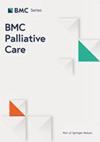摘要
目的:鉴于长期护理(LTC)机构的住院患者普遍患有晚期疾病且身体虚弱,姑息关怀的方法可以帮助他们获得舒适的生活并提高生活质量。然而,长期护理机构在提供姑息关怀方面还存在着巨大的差距。我们旨在介绍一个旨在满足这一需求的姑息关怀咨询团队:方法:我们在加拿大安大略省多伦多市的一家 LTC 养老院开展了一项单中心回顾性队列研究。我们纳入了 2021 年 2 月 1 日至 2023 年 2 月 1 日期间转诊至姑息关怀咨询团队的住院患者,并进行了至少 6 个月的随访。我们采用描述性定量方法研究了姑息关怀咨询团队的使用情况、预先护理计划的变更以及转院情况:结果:87 名住院患者被转诊并接受了姑息关怀咨询团队的治疗。他们的平均年龄为 85 岁,71.3% 为女性,48.3% 有三到四种并发症。大多数住院患者只接受过一次治疗(55.2%)。在死亡的住院患者(53 人)中,41.5% 的患者在转诊时存活时间超过三个月。在预先护理计划中记录了 "转院"(人数=41)和 "完全代码 "状态(人数=17)的住院患者中,分别有 53.7% 和 76.5% 调整为 "请勿转院 "和 "请勿复苏"。住院率为每 1000 名住院患者每年一次:在这家长者照护中心,姑息关怀咨询团队是改善姑息关怀服务的一项重要服务,尤其是在促进预先关怀计划讨论方面。这项研究的结果可为进一步研究针对长者照护中心居民的姑息关怀干预措施提供参考。Purpose: Given the wide prevalence of advanced illness and frailty among residents in long-term care (LTC), a palliative approach to care can support comfort and quality of life. Yet, significant gaps exist with the provision of palliative care in LTC settings. We aim to describe a palliative care consultation team designed to address this need.
Methods: A single-centre retrospective cohort study was conducted at a LTC home in Toronto, Ontario, Canada. We included residents referred to the palliative care consultation team between February 1, 2021, to February 1, 2023, with at least six-months of follow-up time. We used a descriptive quantitative approach to examine access to the palliative care consultation team, changes to advance care plans, and hospital transfers.
Results: Eighty-seven residents were referred and seen by the palliative care consultation team. The mean age was 85 years, 71.3% were female, and 48.3% had three to four comorbidities. Most residents were seen once (55.2%). Among residents that died (n = 53), 41.5% were referred with greater than three months of survival time. Among residents that had advance care plans documenting "Transfer to Hospital" (n = 41) and "Full Code" status (n = 17), 53.7% adjusted to "Do Not Transfer" and 76.5% to "Do Not Resuscitate" orders, respectively. The hospitalisation rate was one per 1000 resident-year.
Conclusions: At this LTC home, palliative care consultation teams represented an important service to improve the provision of palliative care particularly around facilitating advance care planning discussions. The findings of this study may inform further research on palliative care interventions for LTC residents.

 求助内容:
求助内容: 应助结果提醒方式:
应助结果提醒方式:


